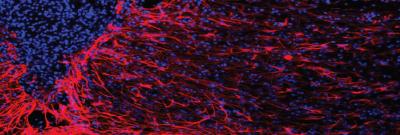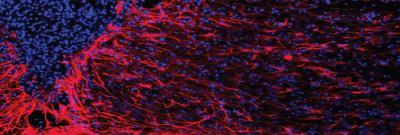
Credit: UT Southwestern
DALLAS – March 27, 2018 – Scientists have found a genetic trigger that may improve the brain's ability to heal from a range of debilitating conditions, from strokes to concussions and spinal cord injuries.
A new study in mice from UT Southwestern's O'Donnell Brain Institute shows that turning on a gene inside cells called astrocytes results in a smaller scar and – potentially – a more effective recovery from injury.
The research examined spinal injuries but likely has implications for treating a number of brain conditions through gene therapy targeting astrocytes, said Dr. Mark Goldberg, Chairman of Neurology & Neurotherapeutics at UT Southwestern.
"We've known that astrocytes can help the brain and spinal cord recover from injury, but we didn't fully understand the trigger that activates these cells," Dr. Goldberg said. "Now we'll be able to look at whether turning on the switch we identified can help in the healing process."
The study published in Cell Reports found that the LZK gene of astrocytes can be turned on to prompt a recovery response called astrogliosis, in which these star-shaped cells proliferate around injured neurons and form a scar.
Scientists deleted the LZK gene in astrocytes of one group of injured mice, which decreased the cells' injury response and resulted in a larger wound on the spinal cord. They overexpressed the gene in other injured mice, which stimulated the cells' injury response and resulted in a smaller scar. Overexpressing the gene in uninjured mice also activated the astrocytes, confirming LZK as a trigger for astrogliosis.
Dr. Goldberg said a smaller scar likely aids the healing process by isolating the injured neurons, similar to how isolating a spreading infection can improve recovery. "But we don't know under what circumstances this hypothesis is true because until now we didn't have an easy way to turn the astrocyte reactivity on and off," he said.
Further study is needed to analyze whether a compact scar tissue indeed improves recovery and how this process affects the neurons' ability to reform connections with each other.
Dr. Goldberg's lab will conduct more research to examine the effects of astrogliosis in stroke and spinal cord injuries. The researchers will determine whether turning up LZK in mice in advance of an injury affects its severity. They will then measure how the formation of the compact scar helps or hinders recovery.
"It has been a big mystery whether increasing astrocyte reactivity would be beneficial," said Dr. Meifan Amy Chen, the study's lead author and Instructor of Neurology at the Peter O'Donnell Jr. Brain Institute. "The discovery of LZK as an on switch now offers a molecular tool to answer this question."
###
Dr. Chen and Dr. Goldberg, who holds the Linda and Mitch Hart Distinguished Chair in Neurology, collaborated on the study with Drs. Binhai Zheng and Yishi Jin at the University of California San Diego.
The research was partially supported with funding provided to the Texas Institute for Brain Injury and Repair by the Texas Legislature. Other support came from the National Institutes of Health, the Howard Hughes Medical Institute, the Patrick and Beatrice Haggerty Foundation, the Beatrice Menne Haggerty Center for Research on Brain Injury and Repair in Strokes, the Robert D. Rogers Advanced Comprehensive Stroke Center, and the Craig H. Neilsen and Wings for Life foundations.
About UT Southwestern Medical Center
UT Southwestern, one of the premier academic medical centers in the nation, integrates pioneering biomedical research with exceptional clinical care and education. The institution's faculty has received six Nobel Prizes, and includes 22 members of the National Academy of Sciences, 18 members of the National Academy of Medicine, and 14 Howard Hughes Medical Institute Investigators. The faculty of more than 2,700 is responsible for groundbreaking medical advances and is committed to translating science-driven research quickly to new clinical treatments. UT Southwestern physicians provide care in about 80 specialties to more than 100,000 hospitalized patients, 600,000 emergency room cases, and oversee approximately 2.2 million outpatient visits a year.
Media Contact
James Beltran
[email protected]
@UTSWNews
http://www.swmed.edu
Original Source
http://www.utsouthwestern.edu/newsroom/articles/year-2018/gene-therapy-stroke.html





